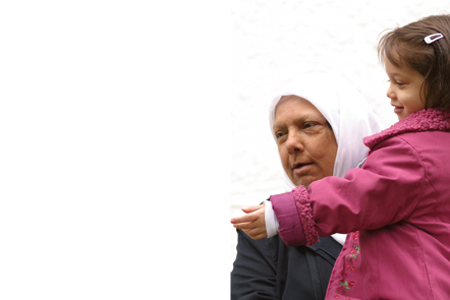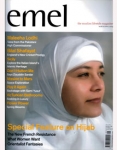
From Mary to Maryam Poppins
Issue 4 Mar / Apr 2004
One of the greatest challenges anybody will ever face in life is becoming a parent. This is a challenge, however, that many are least prepared for. No surprise then that the pay of in-house nannies is one of the more unorthodox indicators of Britain’s financial wealth.
The 15% rise in the average earnings of London nannies is proof that parents are now more willing to place their trust and most precious charges, their children, in the custody of a complete stranger. Safa Malik finds out how this is significant for Muslims.
According to Imams Bukhari and Muslim, the prophet Muhammad said, “All of you are heads of a group and all of you are responsible for your groups; the ruler is the head of state and he is responsible for his people, the man is head of his family and responsible for his family, the woman is the head in her husband's house and she is responsible for the house. In short all of you are heads and responsible for your group."
God has entrusted parents with their children as a trust, test and joy. Together with the provision of love, security and welfare, parents also bear the responsibility to raise their children in the approved Islamic way. In that respect, parenting in Islam is a divine responsibility. However, what is one to do in unavoidable circumstances? For instance, in the case of a single parent who needs to work full-time or situations where both parents need to work or when the parent is unwell?
If parents find themselves in such circumstances, the Muslim community holds the responsibility to create a network that accommodates the needs of such parents and their children. On 21st October 2002, Hanah Kelly and Jahongir Sidikov (right) launched ‘Muslima Nannies’, as a first step towards catering for such needs. According to Jahongir, “We realised that there was a lack of experience in the education of Islam among nannies.” He stated his concern over the few opportunities children who are in the care of nannies have, to learn and develop the Islamic way of life. This became the fundamental drive for the development of an association that he hopes will, “provide a service for Muslim families with young children, as well as Muslim nannies looking for work.”
Hanah previously worked as a nanny herself and explains the aims of the project; “When I first came to this country I was working as a part-time nanny. I realised that many Jewish families are looking for a Jewish nanny. Why? The answer is very simple. They are trying to preserve the traditions of their faith. They eat not all food available in stores. Sometimes they cook in a different way. Their way of life is totally different in comparison to a Christian family. The same is with Muslims.”
Sheima Tuna came to London from Turkey over a year ago. “Coming from abroad it was not easy for me to find the type of work that suited me as a Muslim girl.”
Sheima is now employed by Muslima Nannies and feels she has found the ideal placement. “Working with Muslim families makes me feel more comfortable as I can pray and do other things without feeling selfconscious or awkward. At the same time I feel I am doing something fulfilling.” Sheima reveals her delight at the joys of her job. “What I try to do is make sure that while I play with the children, at the same time, I teach them something. This way they will be having fun, but also be benefiting from it.”
A regular client of Muslima Nannies is the Jalisi family. Hanah Jalisi, age four, is the youngest of four siblings who are all tended by a nanny two days during the week. Speaking to Jahanara Jalisi, Hanah’s grandmother, it became clear why certain families might come to the decision to include a Muslim nanny as an additional member of the family. “We felt that it would be a good idea to have someone to punctuate what we do.” Jahanara explains. She emphasises that “we are always here, but sometime you need a bit of extra help just on the basics.” The principle concern for the Jalisi family is for the children to be taught the etiquettes of their Islamic duties. “They need to learn how to make wudu, stand for salah, recite the Qur’an, learn prayers.” Jahanara elucidates how, “it is all part of their tarbiyyah as Muslims”.
Hanah’s grandparent’s stay in the house even in the presence of the nanny, “not because I don’t trust her, but because otherwise I lose the pleasure to look after them.” Jahanara is quick to point out the positive experiences the family have had with Muslim nannies and the way in which the nanny is drawn into the heart of the family, “the previous nanny was lovely and at the same time she too was very educated. The children call her aunty. Hanah would sit on her lap”
Jahanara also explained that although the family employ a nanny, Hanah’s relationship with her parents remains close and unaffected, “parental duties have not decreased in any way to say the least”. The Jalisi family are eager to provide their children with a grounded and precise Islamic upbringing and it is for this reason that they have chosen to utilize the services of Muslims Nannies.
For further information contact:
Muslima Nannies
15 York Way
London N7 9QG
Tel: 07834216737 (Jahongir) or 07769611335 (Hanah)
email: muslima_nannies@hotmail.com
Bookmark this |
|
Add to DIGG |
|
Add to del.icio.us |
|
Stumble this |
|
Share on Facebook |
|
Share this |
|
Send to a Friend |
|
Link to this |
|
Printer Friendly |
|
Print in plain text |
|


Comments
0 Comments